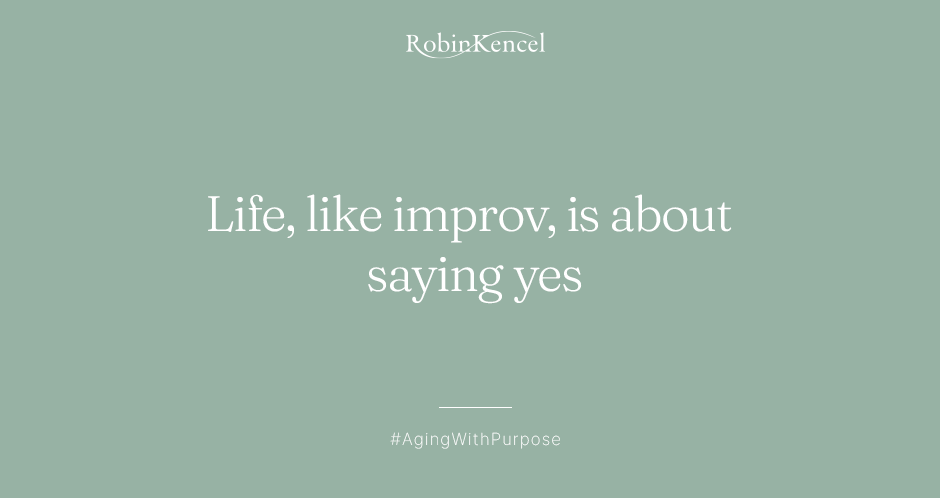Robin’s Writings
In life, just as in improv, it’s not about always having the perfect answer.

I never thought I’d find myself signing up for improv classes. I mean, I had visions of actors on stage, delivering lines with a perfect mix of gravitas and flair like in the movies, all while looking effortlessly chic in their black turtlenecks. What I didn’t expect was how much improv would teach me about… well, life. The more I dig in, the more I am surprised at how much of what I am learning in improv is applicable to “real life”. Improv makes everything from conversations to awkward social situations suddenly seem a lot more manageable.
Take the phrase “Yes, and”. “Yes and” invites conversation and encourages sharing. So much better than “but”, “what if” and “No, that’s not right”. “Yes, and” is about keeping the conversational flow going and, in the process, making things a lot more fun. And, in real life, it’s nothing short of revolutionary.
Imagine I say, “Today is a great day for pizza. ” What’s the first thing that pops into your head? If you’re thinking, “Yes, and I’m craving one with pepperoni,” congratulations—you’re an improv genius. You’ve just opened the door to a conversation, maybe about pizza, maybe about toppings, maybe about the last time you both ate pizza and someone dropped a slice on their shirt (it’s always a thing).
But if you say something like, “But I hate pizza,” or “But I’m on a diet,” well, you’ve just slammed the door, locked it, and thrown away the repartee key. The conversation is over. You’ve just made it awkward. In improv, that’s a total scene killer. And let’s face it, in life, it’s no better. We’ve all been there—the moment you shoot down someone’s idea before it even has a chance to breathe. Not only is it a conversation stopper, but it’s also incredibly discouraging.
I’ll admit, when I first heard about the whole “Yes, and” thing, I thought, “Okay, that’s nice though I’m pretty sure I don’t think I say but all that much.” I quickly found myself, in true Robin fashion, sprinkling “but” into my responses as though I were auditioning for the role of the world’s most annoying scene partner. There I was, in my improv world of imagination, playing a fashion mogul (because, why not?) who corrects my arm-candy partner’s behavior by telling him that true galas don’t have buffets.
Instant scene killer. Of course, my partner’s declaration that he might gorge on hors d’oeuvres at the gala was technically inaccurate but does anyone really care? We’re here to entertain. We’re here to create. My need to correct him and the correctness of his statement only ruined the scene. And– really made me look like a Negative Nancy. There’s no room for that in improv and honestly, there’s no room for it in life either.
Here is the beyond the surface question: Do you build people up, or do you spend your time correcting, judging, or trying to be “right”? The “Yes, and” approach is a brilliant reminder to support others, to encourage, and to promote positivity in real life. It’s about listening, engaging, and offering a little kindness instead of shutting things down with “but” or “what if.” And right there is the intersection of life and improv.
So here’s the takeaway: In life, just as in improv, it’s not about always having the perfect answer. It’s about contributing to the conversation with a little honesty, a lot of humor, and, most importantly, a willingness to let the other person’s ideas breathe. After all, what’s funnier—or more satisfying—than seeing where a conversation can go when you stop trying to steer it and just let it unfold?
Speak your mind, yes, but do it kindly. Because, at the end of the day, what really gets the laughs in improv—and in life—is the honest, unpolished truth. And if that truth happens to include pizza? Well, even better.